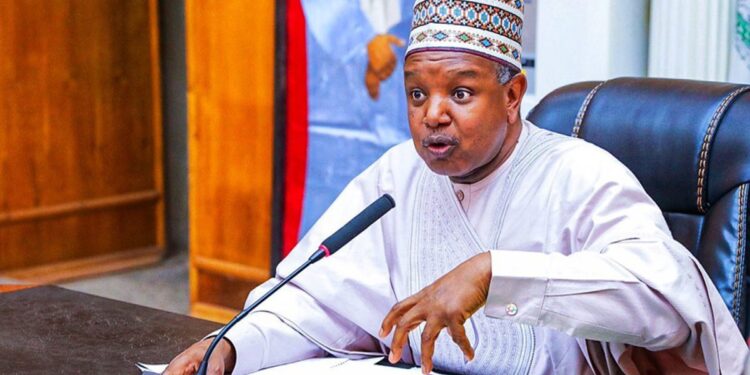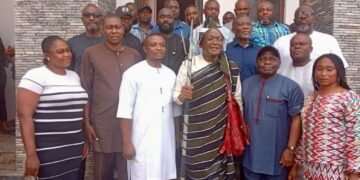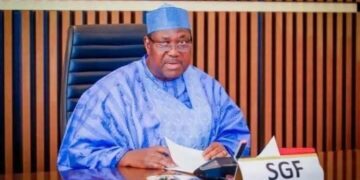The Minister of Budget and Economic Planning, Senator Atiku Bagudu, revealed yesterday that the Federal Government plans to generate N36.35 trillion in revenue this fiscal year. He outlined key strategies for achieving this goal, including strengthening revenue-generating agencies, blocking financial leakages, capitalizing on the removal of fuel subsidies, and floating the naira.
The N36.35 trillion target is part of the N49.7 trillion total in the 2025 Appropriation Bill. Bagudu, speaking before the National Assembly, expressed confidence that the revenue target would be met, citing President Bola Ahmed Tinubu’s directive to Ministries, Departments, Agencies (MDAs), and Government-Owned Enterprises (GOEs) to increase efforts in boosting the country’s revenue base.
The National Assembly’s hearing on the 2025 Appropriation Bill was convened by the Joint Committees on Finance, led by Senator Sani Musa and James Faleke. Bagudu explained that the presidential directive would motivate agencies to work more efficiently, while the government builds on the benefits of fuel and foreign exchange subsidy removals. He also noted that the economic reforms under the Tinubu administration, such as the market-based pricing of Premium Motor Spirit (PMS) and adjustments to foreign exchange policies, had resulted in an estimated N930 billion in previously lost revenue.
The minister, who added that the figure represents about five per cent of revenue losses, said: “These bold and courageous steps, supported by the National Assembly, are intended to correct distortions in the economy, improve expenditure efficiency, and generate more revenues for the three tiers of government.”
Bagudu noted that the removal of fuel subsidies began to significantly impact on revenue generation from October last year, stressing that efforts to ramp up oil production at reduced costs is also expected to lead to additional revenue growth.
President Tinubu, who presented the 2025 Appropriation Bill to the National Assembly on December 18 last year, proposed an expenditure of N49.74 trillion.
The key assumptions for the budget include the crude oil production of 2.06 million barrels per day at $75 per barrel; an exchange rate of N1, 500 to the dollar; 15.75 percent inflation and a Gross Domestic Product (PDG) growth rate of 4.6 per cent.
Despite the projected deficit of N13.08 trillion, Bagudu, who insisted that the Federal Government can generate the targetted revenue to fund the budget, said many lessons were learned from the implemention of last year’s budget.
He said: “The 2024 budget was this administration’s first full-year budget, and the lessons learned have informed the assumptions for 2025.”
He cited the removal of petrol subsidies, deregulation of the foreign exchange market, and efforts to address electricity pricing distortions as key drivers of revenue growth.
Bagudu said these measures have also significantly improved the government’s ability to generate and allocate funds effectively.
The minister said as the Federal Government ensures that the revenue gerating agencies plays their statutory roles, it would also reduce fuel importation.
Bagudu said: “With the support of the National Assembly, we believe the ambitious revenue target of ₦36.35 trillion is achievable.
“The directive for MDAs and GOEs to enhance their performance aligns with the government’s broader economic goals.
“Thee National Assembly’s role in urging these agencies to ramp up their operations would ginger improved performance that would be crucial to meeting revenue targets.”
The minister commended the seamless collaboration between the Executive and Legislature, saying that the administration values the support of the lawmakers.
Last week, the Minister of Finance and Coordinating Minister of the Economy, Mr. Wale Edun, also expressed confidence in the government’s fiscal strategy.
He pointed to the 100 per cent implementation of the recurrent expenditure in 2024 as evidence of the administration’s ability to meet its obligations, despite the economic challenges.
Edun highlighted Nigeria’s GDP growth, which exceeded three per cent in 2024 – a milestone he described as remarkable, compared to developed nations struggling to achieve one percent growth.
He said: “Our focus remains on growing revenues, improving fiscal discipline, and ensuring sustainable economic growth for all Nigerians.”
The minister noted that improved performance by revenue-generating agencies, such as the Nigeria Customs Service and the Federal Inland Revenue Service (FIRS), had driven consistent revenue growth critical to achieving government’s development goals.






